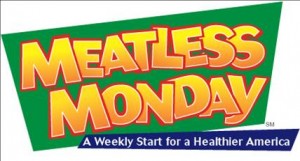 The Associated Students Environmental Affairs Board of UCSB is proud to announce its partnership with The Monday Campaigns, a non-profit organization that runs the Meatless Monday initiative with the Johns Hopkins’ Bloomberg School of Public Health. This national campaign aims to improve the health of both citizens and our planet by helping Americans reduce their meat consumption in a healthful and conscientious manner. During World War II, Americans went meatless on Monday to reduce pressure on the economy and to save money. Now, as our nation and world once again face difficult times, we hope to educate our fellow citizens about how foregoing meat once a week benefits public health, protects our environment, and fights climate change.
The Associated Students Environmental Affairs Board of UCSB is proud to announce its partnership with The Monday Campaigns, a non-profit organization that runs the Meatless Monday initiative with the Johns Hopkins’ Bloomberg School of Public Health. This national campaign aims to improve the health of both citizens and our planet by helping Americans reduce their meat consumption in a healthful and conscientious manner. During World War II, Americans went meatless on Monday to reduce pressure on the economy and to save money. Now, as our nation and world once again face difficult times, we hope to educate our fellow citizens about how foregoing meat once a week benefits public health, protects our environment, and fights climate change.
Considering that meat production is one of the worst causes of global warming, a reduction in meat consumption is the best thing you can do for the environment. Whether it is eliminating meat only on Mondays or more often, you will have a tremendous impact every time you enjoy a meat-free meal. Other groups have tried to ask students to become completely vegetarian, but we recognize that not everyone is willing to make that commitment right off the bat. We also believe that it’s more important for a lot of people to make a small change than for only a few people to cut out meat altogether.
When students “pay” for meat they are not paying for the external costs associated with its production, such as water pollution, greenhouse gas emissions, pesticide pollution from feed crops, rain forest degradation and destruction, and above all health care costs. At a university where students are supposed to have a broad-based education, it seems only fair that they should learn that they aren’t paying for the true cost of meat when they pay for the dining commons, go grocery shopping, or eat out. A good lesson would be for the dining commons to go without meat every once and a while so that they can (1) *learn *about the external costs of meat and about the healthy, delicious alternatives to meat, and (2) *reduce *the external costs that they actually place on the environment and their health. We hope the dining commons considers doing this more.
What UCSB has done
So far we have worked with the Real Foods Challenge chapter here to implement a couple Meatless Mondays in our dining commons. We have also been doing campus outreach-which includes signs with facts about meat’s impact on the environment and tabling with food samples and literature. We recently worked with the residence halls to hold a film screening of the movie “Fresh” in one of the dorms. At that event we had a panel discussion about sustainable food issues and Meatless Mondays. We’ve also attracted the attention of local media and have made it into one newspaper with another pending.
Our plan for next quarter is to approach local restaurants about the possibility of offering discounts, deals, or special vegetarian items on Mondays, as an incentive for students to cut out meat on that day. We are currently working on an informational packet that we will present to the business owners.
We are also in the process of implementing a regular meatless schedule for the UCSB Dining Commons starting for the freshman in Fall 2010. We are doing this by presenting facts from local research done on campus, which revealed that reducing meat and dairy consumption one day a week reduces the same amount of greenhouse gasses as going 100% local. The benefits from supporting local farms are still very important, but this research just puts the severity of meat into perspective.
To support our chefs going local we are also inviting a vegan culinary chef to come and lead a training/ workshop for the UCSB chefs and staff to further educate us about vegan/vegetarian nutrition and the variety of foods that can be used that are not traditionally used.
Best Practices
The Dining Commons set a new precedent when they used the saved money from EAB’s trayless campaign (25% reduction in food costs from reduced waste) towards more local and sustainable food. The vast majority of the top 50 most expensive items dining services purchases are meat and cheese products (keep in mind that they still do not include the external costs). Any decrease in meat consumption has the potential to free up more money to go towards the 20% local food mandate by 2020. This would make UCSB’s dining services a model for every other UC and institutional entity as we evolve to a more sustainable and conscious world. Other UC’s such as Davis and LA have limited their beef consumption as well.
For more information contact the Environmental Affairs Board at ucsbeab (at) gmail (dot) com
or the Co-coordinators Corie Radka corieradka (at) umail.ucsb.edu, Andrew Dunn andrewdunn09 (at) gmail (dot) com







